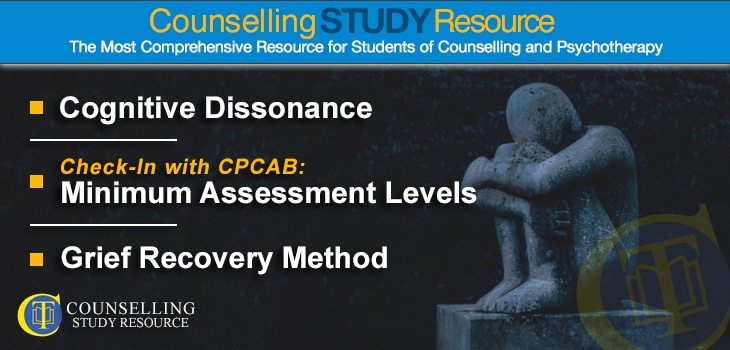143 – Grief Recovery Method
Cognitive Dissonance – Minimum Assessment Levels
In episode 143 of the Counselling Tutor Podcast, Ken Kelly and Rory Lees-Oakes explain cognitive dissonance. ‘Check-In with CPCAB’ then looks at the concept of the minimum assessment levels set by awarding bodies and how course providers may add to these. Last, in ‘Practice Matters’, Rory interviews Carole Henderson, Managing Director of Grief Recovery Europe, about the Grief Recovery Method.
* BACPAC practice management software for counsellors and psychotherapists is a sponsor of the Counselling Tutor Podcast.
Get a 30-day free trial of BACPAC and a 30% discount by using the discount code CT2020
Cognitive Dissonance (starts at 1.20 mins)
A term from psychology, cognitive dissonance refers to when an individual holds two opposing views, and thus experiences a sense of discomfort at the internal conflict.
It was first used by US psychologist Leon Festinger in 1954. Rory shares the story of this, involving Festinger and two colleagues infiltrating a doomsday cult. They described their experiences in a book entitled When Prophecy Fails.
Cognitive dissonance is often seen in counselling clients who are in abusive relationships.
Because people have often invested heavily in such relationships (for example, financially, or in terms of children), they may tend to remain in them and to find ways to justify to themselves that the abusive behaviour is somehow acceptable.
The concept of cognitive dissonance also underpins Stockholm Syndrome.
Rory has written a handout giving an overview of cognitive dissonance, including its history and examples. This is available here.
Check-In with CPCAB: Minimum Assessment Levels (starts at 11.55 mins)
The question of why different colleges set different requirements for students studying the same qualification is raised often in the Counselling Tutor Facebook group.
If you’re not already a member, do come along and join in our discussions of current topics in the world of counselling and psychotherapy with thousands of counselling students, qualified counsellors, supervisors and counselling tutors.
Rory talks to Heather Price (Senior Counselling Professional) at CPCAB (Counselling & Psychotherapy Central Awarding Body) about this question.
She explains that there are two types of assessment: external and internal. While the external assessment is a standard requirement that rarely changes, the internal assessment offers more flexibility to colleges in deciding how they will do this.
Heather describes how CPCAB set minimum standards for internal assessment – for example, that students must have ten hours of personal therapy while studying for the Level 4 Diploma.
However, colleges can add to this – though CPCAB would argue against making excessive demands – for example, if a college proposed more than 40 hours of personal counselling, CPCAB may well object as this could impose an unreasonable financial burden on students.
There are two types of assessment: external and internal. While the external assessment is a standard requirement that rarely changes, the internal assessment offers more flexibility to colleges in deciding how they will do this.
Tutors must submit to CPCAB their plan for internal assessment, and how this is timed throughout the programme. This helps CPCAB ensure that the assessment process is smooth and proportionate.
You can find more information about CPCAB on its website. CPCAB is the UK’s only awarding body run by counsellors for counsellors.
Grief Recovery Method (starts at 27.35 mins)
Rory talks to Carole Henderson (who is not a counsellor) about the Grief Recovery Method and how this offers an alternative to conventional talking therapies.
Designed to address loss in all its forms (not just bereavement – other types might, for example, include relationship break-up and redundancy from work), the Grief Recovery Model is a step-by-step action programme to help people let go of pain.
Carole describes it more as education than therapy, teaching clients a set of tools that they can use to deal not only with their current loss but also with future losses.
Carole trains people from many professions – such as counsellors, funeral directors and even financial advisers.
Carole describes research from the US that suggests the Grief Recovery Method – which addresses knowledge, attitudes, beliefs and behaviours – is effective.


